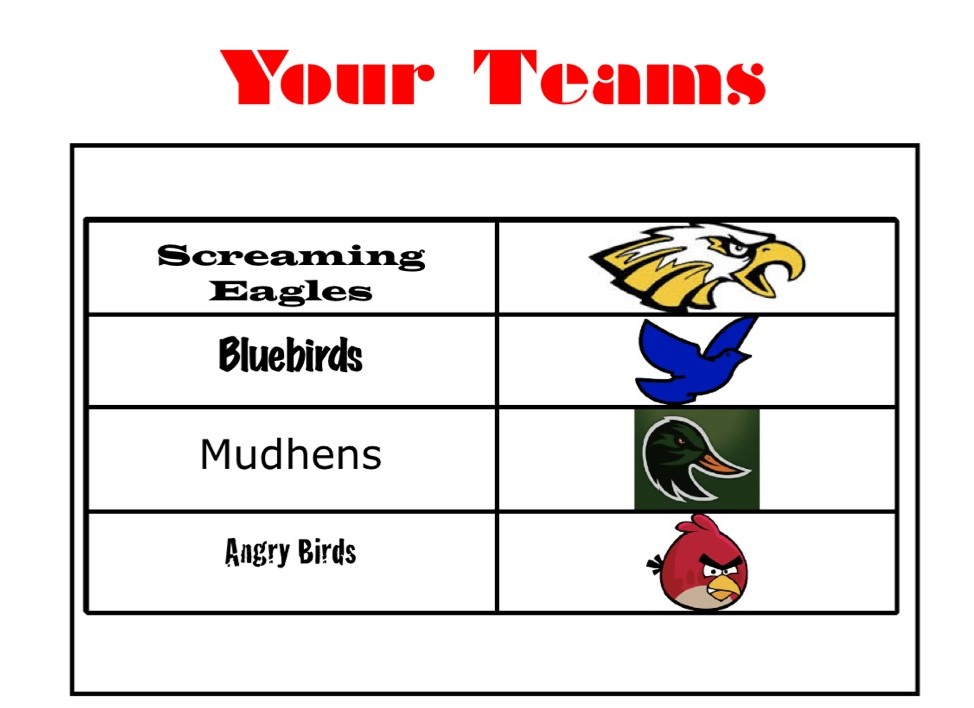The lecture that Dr. Margaret Early gave based on her research into innovative arts-based learning in high school English Learners’ classroom had some connections to the presentation Eury Chang and I gave for LLED 536: Drama and Literacies in Education. One fond memory I was able to recreate for this presentation on Johnny Saldaña’s textbook was a list of team names, based on Dr. Lee Gunderson’s comments (a few years back) on the tendency for teachers to group language learners together in a classroom, so that no one learns from another. He splits up the class into three aptly named groups: the go-getting Screaming Eagles who need little support with language and race ahead of others in the class; the chatty Bluebirds who could make more of an effort to learn but are perched comfortably on top of the bell curve; finally, the Mudhens, who are all sinking together in a mire of misunderstanding and miscommunication. To these three, I added the Angry Birds to categorize the language learners who would rather just be gamers. A lot of my research for LLED 601 and 558 will examine virtual worlds in video games and their influence on students, and one discovery I made through games like Angry Birds is the self-efficacy of players: when they get to tricky puzzle or face a challenge in the game, they can keep trying until they get it right and advance to a more challenging level. The game design even uses gold stars, and it is very similar to an A (or an E) for effort, rather than the Mudhen-teaching strategy where it all of it is too confusing and learners don’t bother learning anything. Even for part of the game that the player already finished, there is the choice to go back and replay the level, earning a higher rank (three gold stars instead of one) than just getting by with the bare minimum. True that this game is part of a corporate machine that has got merchandizing on its mind, there is even a reported daycare centre in China decked out with Angry Bird activities, but it also has some educators talking about new learning strategies, such as this blog post on A Lesson in Assessment FOR Learning. Fine for Team Angry Birds, but what about the Mudhens?

A New Hope FOR assessing students?
Back to the research. One word that stood out in Marshal and Early’s case study was “force” the students admitted to feeling when they worked on literacy mandela: they were forced to speak English, forced to work together, forced myself. While the researchers reflect on these comments and give them an optimistic interpretation of the students’ word choice, there is still something about students admitting that they would not have done this sort of activity unless there was external pressure. On the one hand, it is an effective strategy to make students groups where at least one member had to speak a different language that the others, and English becomes the default language of communication. On the other hand, it still is an artificial situation common enough for the only student in the classroom who speaks Farsi or Russian, but seems to knock away the support Cantonese or Tagalog speakers would normally rely upon: others who understand them. The students need to feel the force from within, rather than feeling singled out because there are too many of “you guys” in the classroom. Cummins et al. present a slightly more student-driven format for learning the language by making it part of their identity creation. It was a little disorientating to read about the No Child Left Behind policy as it relates to Canadian students, but nevertheless, still impressive. Got to hand it to Marshal and Early, howevr, for creating and implementing a wonderfully visual literacy exercise based on student-made mandelas, and three gold stars for referencing Carl Jung at the end of their paper!

Life Magazine show Carl Jung at his Mandela
